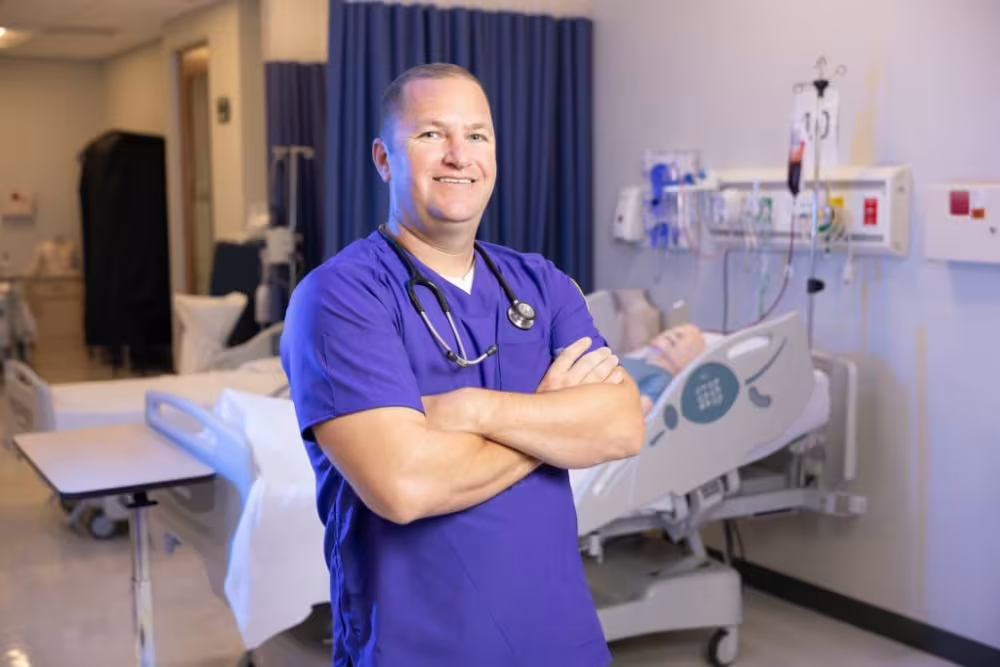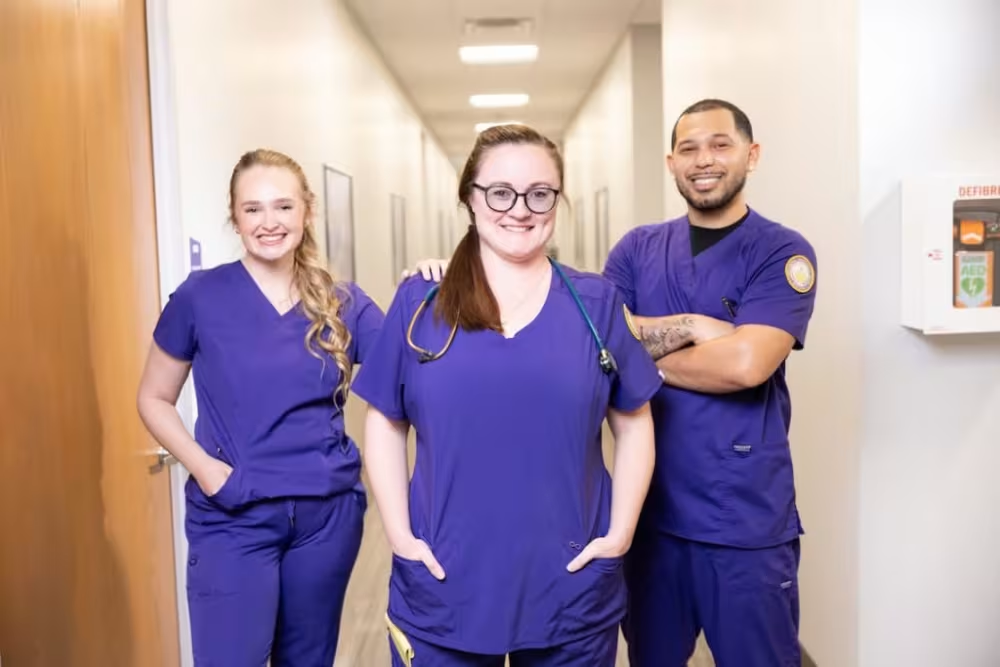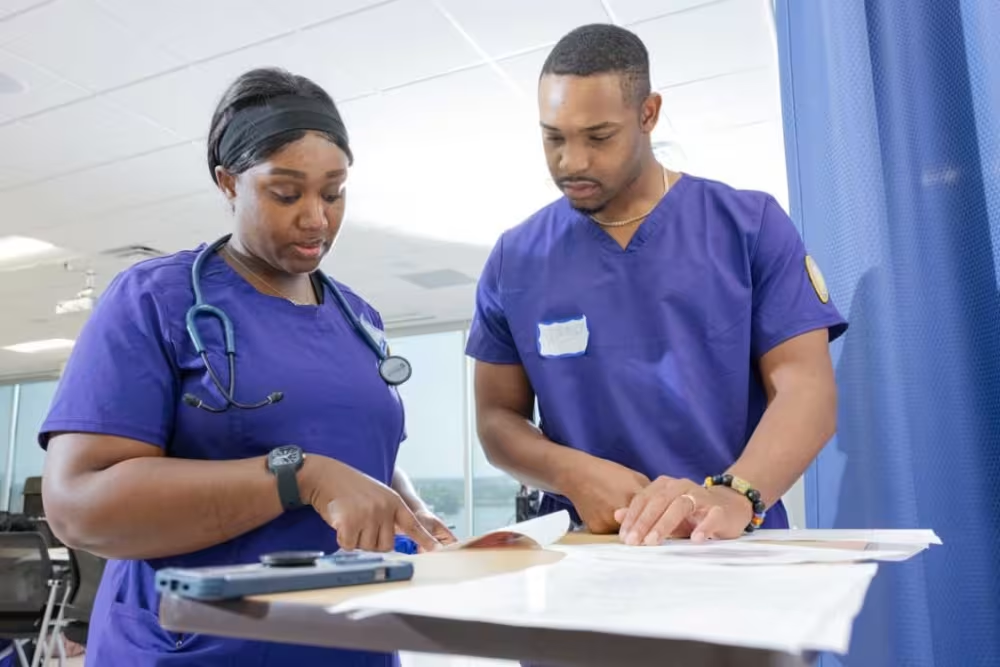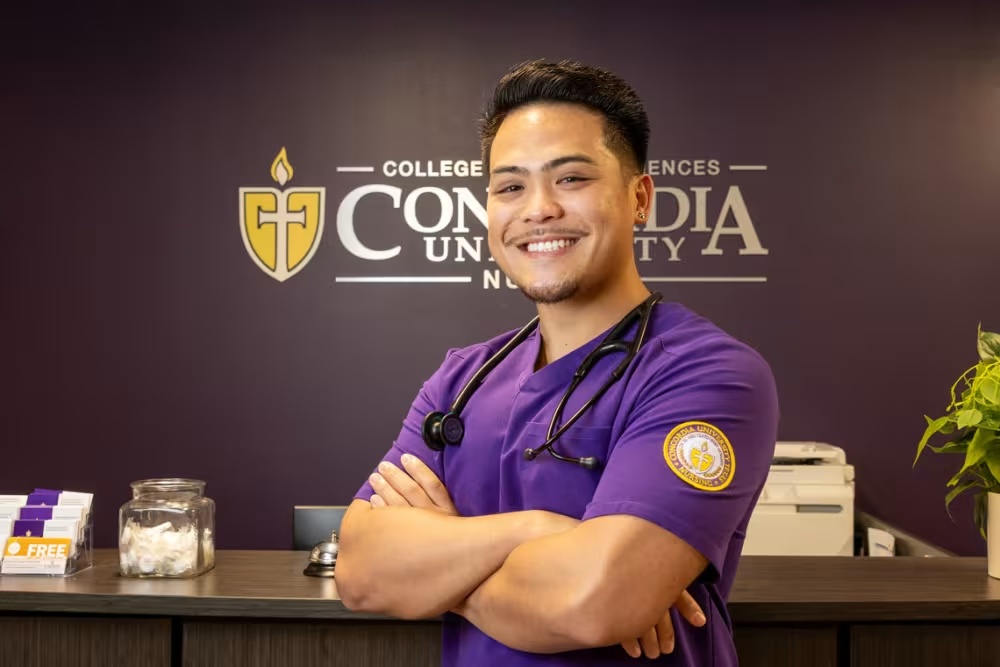How to Become an APRN
Each blog post is dated and contains accurate information as of that date. Certain information may have changed since the blog post publication date. If you would like to confirm the current accuracy of blog information, please visit our ABSN overview page or contact admissions at (866) 891-1371.
What is an APRN? An APRN is an advanced practice registered nurse, such as a nurse practitioner, certified nurse midwife, clinical nurse specialist, or certified registered nurse anesthetist. They have advanced nursing education, training, board certification, and serve as leaders and mentors with a broader scope of practice than RNs.

A career in nursing offers many opportunities for growth, such as advancing from a registered nurse (RN) to an advanced practice registered nurse (APRN). Becoming an APRN requires clinical experience, graduate-level education, and board certification. It takes time and dedication; however, if you have a non-nursing bachelor’s degree or college credits, you can expedite the process with an accelerated Bachelor of Science in Nursing (BSN) program.
Concordia University Texas’s Accelerated Bachelor of Science in Nursing (ABSN) track can help you fast-track your nursing career by earning a bachelor’s degree in as few as 16 months upon successful completion of prerequisites. You’ll gain the clinical training and didactic nursing knowledge necessary to pursue entry-level nursing jobs. From there, you can pursue career growth.
Before starting your nursing journey, look at answers to common questions, such as “What is an APRN?” Then, explore the career pathway.
What Is an APRN?
An APRN is an advanced clinician who serves as a nurse leader, mentor, and advocate. These nurses continue to provide direct patient care, but have a broader scope of practice than RNs. Specific responsibilities and practice authorities vary by specialty, setting, and jurisdiction.
Types of APRN Specialties You Can Pursue
The four main types of APRN’s are:
- Nurse practitioner (NP)
- Clinical nurse specialist (CNS)
- Certified registered nurse anesthetist (CRNA)
- Certified nurse midwife (CNM)
Within those categories, nurses can choose from different subspecialties. For example, a CRNA might specialize in pediatric anesthesia, or a nurse practitioner might specialize in adult-gerontology.

The Role of an Advanced Practice Registered Nurse
What is an APRN’s main role? Their most important responsibilities are to promote favorable patient outcomes and protect their patients’ health and safety. They provide advanced clinical care, sometimes managing complex cases.
An advanced practice nurse also typically serves as a leader who mentors other nurses and serves as a valuable source of clinical knowledge and experience. These nurses are advocates for their patients and drivers of positive change within the health system.
The specific responsibilities of an advanced practice nurse vary by specialty, setting, and jurisdictional practice authority, but may include:
- Diagnosing acute and chronic conditions
- Developing treatment plans
- Delivering patient education
- Prescribing and administering medications
- Managing chronic conditions
- Promoting health in communities
Pathway to Becoming an APRN
If you aspire to reach the pinnacle of clinical nursing, consider following these steps to become an advanced practice registered nurse:
1. Earn a BSN Degree
Your first step is to earn a Bachelor of Science in Nursing degree. This step typically takes four years to complete through a traditional BSN program; however, individuals with a non-nursing bachelor’s degree or college credits can leverage their experience to earn a BSN faster through an accelerated program.
If you have a non-nursing bachelor’s degree or at least 60 college credits, you can complete your degree in as few as 16 months after fulfilling the prerequisites through Concordia University Texas’s ABSN track.
Our nursing track offers online-based nursing theory coursework, which establishes a solid foundation in nursing theory, nursing clinical practice, pharmacology, leadership, and more.
Another key component of your accelerated nursing education is experiential learning in our state-of-the-art nursing labs. These labs simulate the clinical environments you’ll experience as an RN. In skills labs, you’ll practice and hone nursing skills, from vital sign assessment to IV insertion, in a supervised setting. In simulation labs, you’ll learn how to apply the nursing process to develop appropriate nursing responses.
The final component of the BSN degree track is clinical rotations. During your clinical rotations, you’ll work alongside our experienced clinical faculty to provide patient care under supervision and gain diverse nursing experience.
Clinical placements also allow you to network with area healthcare employers. If you make a good impression, you may have an advantage when it comes time to apply for jobs.
2. Pass the NCLEX-RN and Obtain Licensure
Once you’ve completed a BSN, the next step toward becoming an APRN is obtaining RN licensure. To become a licensed RN, you must earn a proficient score on the NCLEX-RN. This exam evaluates both nursing knowledge and critical thinking skills.
To register for the NCLEX-RN, you must first complete all requirements from a nursing program. Once you pass, you can register with your state board of nursing (BON) to obtain a license. Since nursing license requirements vary by state, you should check with your state regulatory board before applying.

Discover your guide to passing the NCLEX.
3. Gain RN Experience
Most graduate programs require applicants to have at least a year or two of clinical experience before admission. During this time, you’ll be able to determine if your choice of nursing specialty is really the right one for you or if you’d like to take a different path.
Deciding your best fit within the field is crucial for preparing to become an APRN, as you’ll need to choose an advanced practice specialty when you apply to graduate school.
4. Enroll in a Graduate Program
Once you’ve earned a BSN and gained experience as an RN, the next step is to enroll in a graduate-level nursing program. You can earn either a Master of Science in Nursing (MSN), a Doctor of Nursing Practice (DNP), or both, depending on your career goals. Be sure that the school you choose is fully accredited before enrolling.
- MSN: MSN degrees build on the foundational knowledge you learned during your BSN program. By completing an MSN, you’ll gain an advanced understanding of nursing practice. Your MSN degree will focus on a specific APRN specialty, such as family nurse practitioners (FNPs).
- DNP: An MSN can prepare you to earn a DNP, although some nurses earn a DNP from a BSN to DNP program. A DNP can be a great choice, particularly for aspiring nurse practitioners and future certified registered nurse anesthetists. There have been calls within professional nursing organizations to make the DNP the minimum requirement for NPs and CRNAs. Regardless of specialty, the DNP provides advanced doctoral education and clinical training.
5. Earn Board Certification and Obtain an APRN License
Licensing criteria varies by state, but all states require a proficient score on a national board certification exam in your chosen specialty. These exams assess general advanced practice nursing competency, as well as understanding of specialty populations.
After passing this exam, you can apply for APRN licensure in your state. Be sure to renew your certification and licensure regularly by meeting continuing education and other requirements. For more information about these requirements, contact your state’s regulatory agency.

What is nursing school like? Discover what you can expect at Concordia University Texas.
Skills and Competencies Needed for Advanced Practice
An advanced practice nurse needs strong clinical competencies, including patient assessment, diagnostic, and clinical skills specific to their specialty. For example, a CRNA needs in-depth knowledge of anesthesia and pain control drugs, airway management skills, and the ability to accurately calculate medication dosages for each patient.
Soft skills that are essential for all types of advanced clinicians include:
- Communication skills
- Critical thinking
- Decision-making skills
- Leadership
- Cultural competence

Ready to Become an Advanced Practitioner? Let Us Help You Get Started
Concordia University Texas offers a pathway toward nursing for transfer students and individuals interested in switching careers. If you have a completed non-nursing bachelor’s degree or at least 60 credits, you may be eligible to apply to our ABSN track.
You’ll receive extensive support as a nursing student in Austin or Dallas-Fort Worth. Contact an admissions counselor today to get started.
